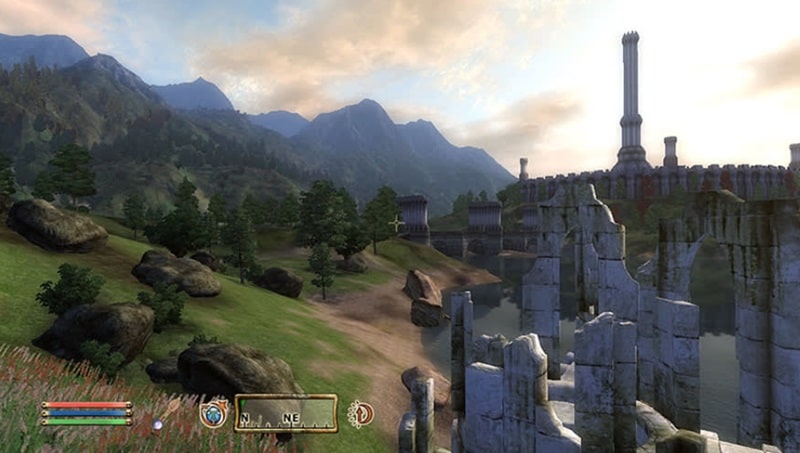Bethesda Softworks, which has offices in Maryland, has long since established itself as one of the best developers of Western RPGs. At the heart of their success are their two flagship franchises: The Elder Scrolls and Fallout. Whether tracking across Tamriel or the ruins of ’50s America, both of their open worlds are littered with stories.
Both franchises have inspired creators since the 90s, from MMORPGs to big-budget streaming shows. However, many wonder how these series compare in their creative directions. Here is a breakdown of the Elder Scrolls and Fallout franchises to help understand Bethesda’s direction for both.
Their Gameplay
First and foremost, the divide between Elder Scrolls and Fallout rests upon their primary distinctions of genres: fantasy and science-fiction RPGs. Broadly, both of these genres take sharp divides. Within the Elder Scrolls games, players will always be more fantastical characters. They can choose between elves, reptiles, cat-people, mages with endless spells, or even the Dragonborn. While not as restrictive, these games also featured a rudimentary “class system” from which rogues and wizards could build.
Within Fallout, players are usually everymen living within underground vaults forced out of their safety into the barren world. To compensate, players must gather ammo and use the technology of the old world to enhance themselves. Furthermore, Fallout does not possess a traditional “class” system, giving players more leeway in micro-managing their build.
Their Vast Worlds

Of course, what most strongly unites these franchises is their open-world nature. This means the games are non-linear and allow players to navigate most maps at their leisure. Whereas the Scrolls games blend differing fantasy styles such as dark, low, and high fantasy, Fallout remains more focused. Their games follow the “atompunk” subgenre based on the Cold War era during the 50s, with similar themes.
In this regard, the sibling series are the most similar. Both worlds remain open for most of their main gameplay loop, leaving players open to explore. These maps are also littered with recurring dungeons, such as Dwemer ruins and forgotten nuclear vaults. Furthermore, both worlds are filled with recurring factions, such as the Brotherhood of Steel and the Dark Brotherhood, that usually have one plotline per game.
The Elder Scrolls’ Mysterious Lore
Furthermore, these series have volumes of lore shrouded in myth and propaganda for differing reasons. Given the number of aloof gods overseeing Tamriel and the many bickering religions speaking for them, the actual lore of the world is usually shrouded in myth. These stories typically span thousands of years, go through various dimensions, and feature several cataclysmic events such as the Oblivion Crisis.
In Fallout, the world was not destroyed by clashing gods but by clashing nations. The great mystery of the series is which nation launched the first nuke that destroyed the world during their alternate ending of the Cold War. This vicious cycle builds upon the theme that “war never changes.” At the core of both, players are left open to judge the ethics and actions of historical figures in deciding their allegiance to their modern descendants.
Fallout’s More Timely Messages
Finally, the most meaningful division between these series is their differing stories and messages. While both follow characters who can decide their world’s fate and choose from morally grey factions, they divide in the messages they deliver. While appearing as a fantasy series, the Elder Scrolls franchise has cosmic horror elements. Players become pawns to the Daedric Princes regardless of their moral codes. While Skyrim’s political Civil War has sparked fan debate, their stories are largely philosophical regarding man’s place in the universe.
Fallout, on the other hand, delivers far more politically relevant stories. Instead of cosmic gods and ancient empires, vault dwellers deal with the Soviet Union and the remnants of massive corporations. The ruins of America are littered with exceptionalist propaganda warning of the “Red Menace.” The story also satirizes the consumerist mindset created by corporations such as Vault-Tec.
Conclusion
So, to conclude, both series have striking similarities and great differences as open-world games. Both franchises push the boundaries of their respective genres and ideals. The Elder Scrolls is an epic fantasy in which players are gods among men who change history. In Fallout, players are just one survivor among many in a world torn apart by real-life political factions and institutions. Despite their differences, the fandoms of both games have always been friends and enjoyed each other’s games. Furthermore, both series have continued to evolve and expand, with many more stories on the way. Fans can only speculate with a new season of the Amazon Prime show approaching and ES6 coming.
For More Great Content
Craving top-tier content that covers it all? From electrifying sports highlights and insider entertainment news to expert gaming tips and sharp betting advice, we’ve got you covered. Dive into our curated articles to stay ahead of the game with the latest sports action, uncover the hottest trends in entertainment, and get the lowdown on gaming strategies that could level up your play. Plus, our betting advice will sharpen your edge and boost your chances of winning big.
Whether you’re looking to stay updated or gain a competitive edge, our content is your go-to source for all things exciting and relevant. Don’t miss out—explore now and power up your knowledge! Follow us on Twitter/X @TotalApexSports, to stay informed.

